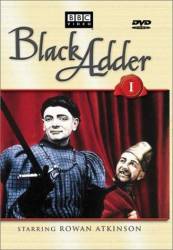Question: Many times during the series, Lieutenant is pronounced as 'Left-tenant'. Why?
Question: The back of the Goes Forth DVD cover lists Tony Robinson's character as 'Private S. Baldrick'. What is Baldrick's first name?
Answer: The closest we ever get to knowing his first name is in series 3, when he claims it's "Sod Off". Blackadder asks him in series 3 where this came from, and he replies "Well, when I was a kid, living in the gutter, I'd go up to the other kids and say 'Hello, I'm Baldrick'. And they'd say, 'Yes, we know. Sod off, Baldrick.'" The S in this series is likely a reference to that, but it's not addressed, and given this Baldrick is clearly different from the series 3 Baldrick, we can't draw a direct link.
Question: When Blackadder is imprisoned with Baldrick and notices the door has been left open, why doesn't he escape? Why does he want the door closed and locked?
Answer: The Baron tells Blackadder they will be sent to a convent school outside Heidelberg to spend the rest of the war teaching young girls home economics, which he sees as the ultimate humiliation. Blackadder, however, is delighted to be spending the rest of the war "teaching nuns how to boil eggs" rather than being shot at every day.
Question: Who played the balladeer and why was Blackadder trying to kill him?
Answer: Tony Aitken played the Balladeer. Blackadder wants to kill him because he annoys him and usually sings songs about what a fool he is.
Question: Does anyone know what the actors are saying during their 'anti-Macbeth' chant?
Answer: According to the IMDB.com's quote page for Blackadder The Third, it's "Aahhhhh. Hot potato, orchestra stalls, Puck will make amends. Owwwwww."
Question: Who did the Shadow's voice when she is pretending to be a man?
Chosen answer: Warren Clarke (who played Amy's father) voiced the male Shadow, in the style James Mason.
Question: At the end of every series, except the third, Blackadder dies. Then he's alive at the start of the next one. Is this the same man? I once heard he's sort of his own descendant. How does it work?
Answer: The Blackadder in each series is a descendent of some description of the previous Blackadder. However, from the second series onwards he is essentially the same person transplanted into a different time and lower social class - mocking the original character's wish to be king by taking him further from the noble life until he becomes simply 'cannon fodder'. Check out Blackadder's Wikipedia entry for pretty much everything you need to know.
Question: Do Blackadder, Baldrick, George and Darling die at the end or is it kind of like Butch Cassidy and the Sundance kid where we don't really know?
Answer: It's exactly like Butch Cassidy and the Sundance Kid. No one knows for absolutely sure, but it is a near-certainty that they did because they were in the first wave charging across no man's land. Like BC and the SK, they stop the scene just as they were rushing in.
Question: What is the strange plopping type noise that is heard a few times in this episode? I think it is first heard when Sean, the Irish B*****d is introduced.
Answer: I checked my subtitles and it reads "cork pops". It seems Sean is a typical Irishman and enjoys copious amounts of drink. When the Friar is intoduced you can see him on the left of the group and it looks like he is opening a bottle.
Question: Can anyone hear the (heavily slurred) words of the ending song in this episode - or is it just random garbage?
Chosen answer: Black Adder couldn't hold his beer. The art of boozing he's not mastered. And I, your merry balladeer, Am also well and truly plastered. Black Adder, Black Adder, a bit like Robin Hood. Black Adder, Black Adder, but nothing like as good. Black Ad(hic), Black Adder, I thought that he had died. Black Adder, Black Adder, our writers must have lied.
Question: When Blackadder is taunting Dr. Johnson with his knowledge of the English language, are any of the words he says legitimate words? If so what are their definitions?
Answer: None of them are actually real words, although, in most cases, they're close enough to genuine words that some sort of plausible meaning can be determined. Good examples would be "interludicle", which is obviously a variant on "interlude", "velocitous", a play on "velocity" expressing Edmund's desire that Dr Johnson leave as soon as possible or "anaspeptic" which could be drawn from the prefix "ana", meaning "up" and "peptic", which refers to the stomach - possibly some sort of vomit reference.






Answer: That's the standard British pronounciation.
Moose ★